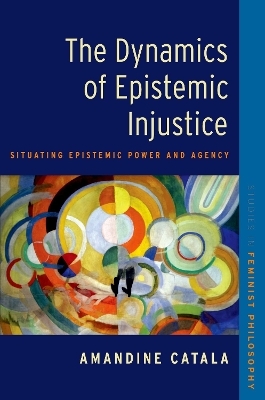
The Dynamics of Epistemic Injustice
Situating Epistemic Power and Agency
Seiten
2025
Oxford University Press Inc (Verlag)
978-0-19-777631-5 (ISBN)
Oxford University Press Inc (Verlag)
978-0-19-777631-5 (ISBN)
- Noch nicht erschienen (ca. Mai 2025)
- Versandkostenfrei innerhalb Deutschlands
- Auch auf Rechnung
- Verfügbarkeit in der Filiale vor Ort prüfen
- Artikel merken
Epistemic injustice refers to the injustice that a person suffers specifically in their capacity as a knower--i.e., as someone who produces, conveys, or uses knowledge. Epistemic injustice occurs every day when members of non-dominant groups are not included or taken seriously in conversations or social representations due to individual or societal biases.
Epistemic injustice is inherently connected to epistemic power and epistemic agency: understanding and addressing epistemic injustice allows us to better understand and address epistemic power and agency, and vice versa. Yet, despite vast and rich discussions of epistemic injustice, which often invoke the notions of epistemic power and epistemic agency, both notions remain undertheorized and hence largely elusive. Amandine Catala offers a systematic account of epistemic power and agency by turning to the dynamics of epistemic injustice -- that is, the many forms epistemic injustice can take, the different sites and mechanisms through which it operates, and the various transformations consequently required to cultivate greater epistemic justice.
Adopting standpoint theory as both a theoretical and a methodological framework, Catala considers several pressing social questions, such as deliberative impasses in divided societies, colonial memory, academic migration, the underrepresentation of members of non-dominant groups in certain fields, the marginalization of minoritized minds such as intellectually disabled people, and the underdiagnosing of autistic women. By analyzing these social questions through the lens of the dynamics of epistemic injustice, this book makes two main contributions: it develops a systematic account of epistemic power and agency that highlights the interaction between individual and structural factors, and it offers a pluralist account of epistemic injustice and agency that reveals their non-propositional and non-verbal dimensions.
Epistemic injustice is inherently connected to epistemic power and epistemic agency: understanding and addressing epistemic injustice allows us to better understand and address epistemic power and agency, and vice versa. Yet, despite vast and rich discussions of epistemic injustice, which often invoke the notions of epistemic power and epistemic agency, both notions remain undertheorized and hence largely elusive. Amandine Catala offers a systematic account of epistemic power and agency by turning to the dynamics of epistemic injustice -- that is, the many forms epistemic injustice can take, the different sites and mechanisms through which it operates, and the various transformations consequently required to cultivate greater epistemic justice.
Adopting standpoint theory as both a theoretical and a methodological framework, Catala considers several pressing social questions, such as deliberative impasses in divided societies, colonial memory, academic migration, the underrepresentation of members of non-dominant groups in certain fields, the marginalization of minoritized minds such as intellectually disabled people, and the underdiagnosing of autistic women. By analyzing these social questions through the lens of the dynamics of epistemic injustice, this book makes two main contributions: it develops a systematic account of epistemic power and agency that highlights the interaction between individual and structural factors, and it offers a pluralist account of epistemic injustice and agency that reveals their non-propositional and non-verbal dimensions.
Amandine Catala is a Full Professor in the Department of Philosophy at Université du Québec à Montréal, where she holds the Canada Research Chair on Epistemic Injustice and Agency, and is a Senior Research Associate at the African Centre for Epistemology and Philosophy of Science, University of Johannesburg. She received her PhD from the University of Colorado at Boulder.
| Erscheint lt. Verlag | 21.5.2025 |
|---|---|
| Reihe/Serie | Studies in Feminist Philosophy |
| Verlagsort | New York |
| Sprache | englisch |
| Maße | 156 x 235 mm |
| Themenwelt | Geisteswissenschaften ► Philosophie ► Erkenntnistheorie / Wissenschaftstheorie |
| ISBN-10 | 0-19-777631-0 / 0197776310 |
| ISBN-13 | 978-0-19-777631-5 / 9780197776315 |
| Zustand | Neuware |
| Informationen gemäß Produktsicherheitsverordnung (GPSR) | |
| Haben Sie eine Frage zum Produkt? |
Mehr entdecken
aus dem Bereich
aus dem Bereich
die Grundlegung der modernen Philosophie
Buch | Softcover (2023)
C.H.Beck (Verlag)
18,00 €
Buch | Softcover (2023)
Reclam, Philipp (Verlag)
7,00 €

![Was heißt Denken?. Vorlesung Wintersemester 1951/52. [Was bedeutet das alles?] - Martin Heidegger](/media/113619842)
